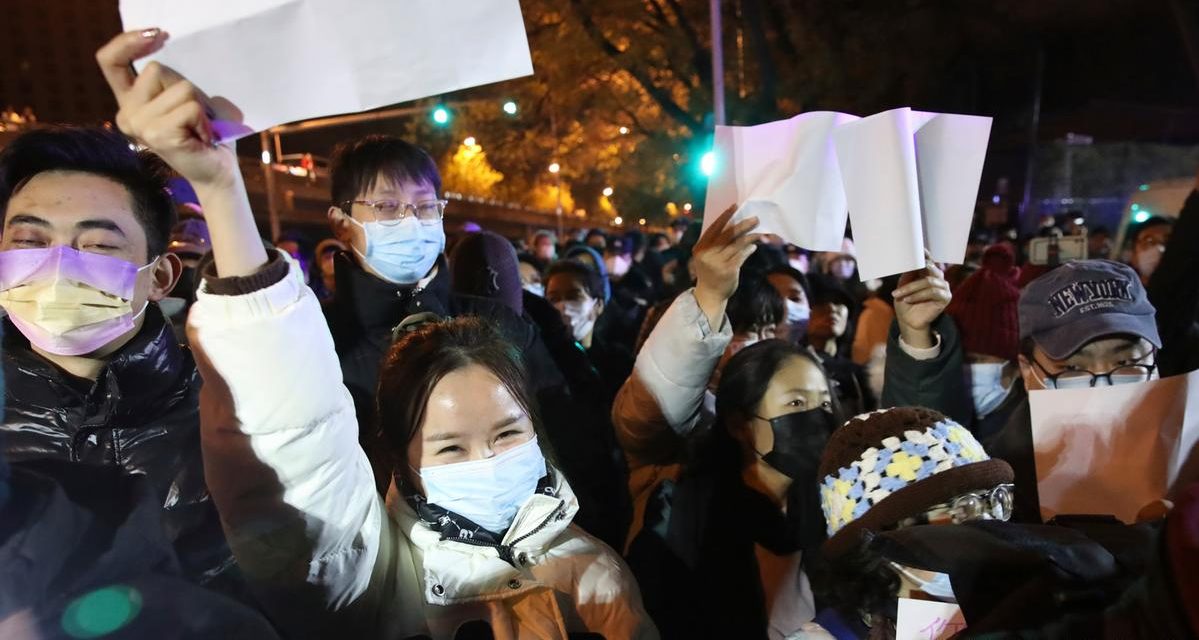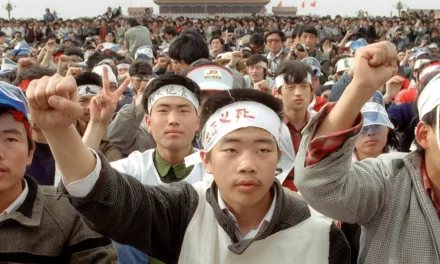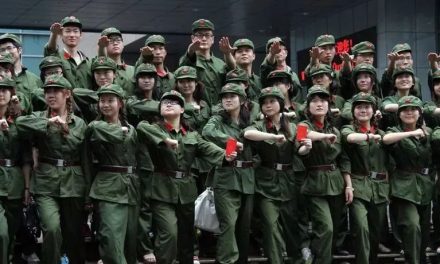First, the Chinese people have demanded freedom. They have demonstrated their contempt for the CCP and Xi’s rule. The strength with which they have pressed their demands might have surprised many in the West. In recent years, many people have bought into CCP propaganda, mistakenly believing that the Chinese people support the Communist Party and Xi. In January 2022, a spokesman for the Chinese foreign ministry smugly cited a poll that the Ashe Institute at Harvard’s Kennedy School has conducted for ten consecutive years. According to the spokesman, the poll shows that the Chinese government enjoys one of the world’s highest rankings in terms of citizens’ satisfaction with it: More than 90 percent of Chinese citizens are reported to be satisfied with it.
Second, the boldness of the blank-page revolution has reduced the fear that the Chinese people have of the CCP. There is an ancient Chinese saying, “They eye each other in the street,” meaning that the people show their feelings about the government only secretly. That traditional fear of the party is weakening. The protesters understood that they incurred great risks as the police presence, closed-circuit TV, omnipresent recognition software, and tracking techniques exposed them to the risk that they would be identified and punished. The boldness of the protesters in the face of so much intimidation is a testament to their heroism. They were likely heartened by their understanding that many Chinese citizens who could not protest nonetheless support them.
Fourth, the problems of Xi and the CCP are internal as well as external. The protests and their aftermath have the potential to result in yet more protests and to deepen existing rifts within the party leadership. It was widely believed that Xi at the 20th Party Congress in October secured the position of “president for life.” No doubt he is in charge of the CCP and his leadership is secure. Nonetheless, tensions within the leadership are significant, and Xi’s enemies will attempt to take advantage of any opportunity. Moreover, Li Keqiang, Wang Yang, Hu Chunhua, and others sidelined by Xi at the 20th Congress will remain in their government posts until next March. That ensures that Xi’s opponents within the leadership of the party will have a window of opportunity until then. Xi also faces opposition from Deng Xiaoping’s son and members of the late Jiang Zemin’s faction. While they are not sufficient to topple Xi, a coalition of the enemies within the party, coupled with subsequent protests and economic or international crises or setbacks for China, could pose a serious challenge to him. Though that possibility is remote, the stars could align to form an existential threat to his leadership.
Sixth, the blank-page revolution will recur. We should consider such an event a precursor to future protests that will be triggered by similar causes — economic crisis, international threats or conflict, or the continuation of “zero Covid” policies. There is a telling example from Chinese history: The protests of 1987 were followed by protests of much greater force at Tiananmen Square in the spring of 1989.
Seventh, the West and the Biden administration in particular can do much to assist the protesters in the near term and to help them prepare for the next round of protests, which are sure to come. Thus far, the Biden administration’s response has been inexcusably weak.
For sure, Xi Jinping will do everything in his power to reignite fear in his comrades and in the people and to promote his image as that of an invincible great leader who knows best. The international community should use all available means to support pro-democracy forces and to deter the Beijing regime from resorting to force, and especially to prevent another massacre on the scale of Tiananmen.
Now is the time for the Biden administration to take bold action to demonstrate support for China’s civil society and popular movements. It should establish the office of a human-rights czar for China. Besides voicing support for the protesters and for public demonstrations in Western cities and universities, the administration and other Western governments should collaborate more closely with the Chinese diaspora and with human-rights organizations and international organizations such as the Nobel Committee. Such efforts should be reflected in official documents and in bilateral and multilateral meetings, including those of the G-20.
Western governments should also promote technologies that can provide Chinese citizens with unfettered access to the internet so that they can better develop their country’s civil society. Let the Biden administration use its bully pulpit to shame Apple and any other corporation that may have in effect gagged the protesters, who have needed to communicate with speed and on a platform that would be harder for Beijing’s security services to monitor.
Now is the time for the Biden administration, its allies, and the global community to stand on the shoulders of the protesters and take bold action against the CCP, to build the coalition that can affect its downfall. The legacy of the blank-page revolution will be long. Its implications are multifaceted. It has likely lit the fuse of a larger revolution that will yield a free China.
This article first appeared in National Review on 12/1/2022.





















